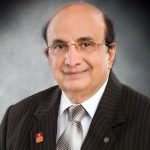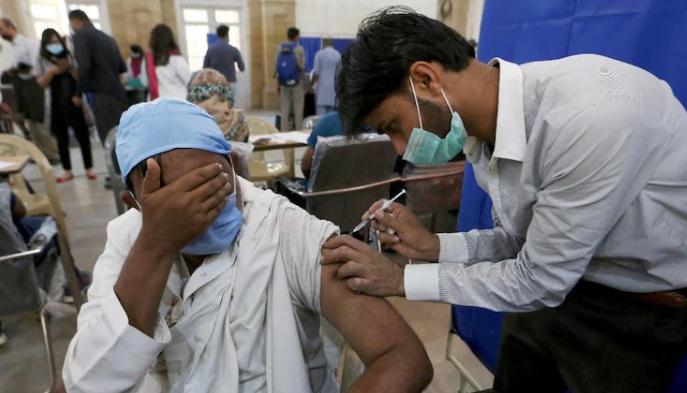By: Mr Ashok Mahajan
On 1st May this year, India recorded over 4 lakh daily cases for the first time, surpassing its daily tally during the peak of first wave in 2020, in terms of the number of new cases and deaths per day. While the vicious suddenness of the second wave has left us confused and terrified, there are lessons to be learned from the past few weeks of our fight against coronavirus.
In such a scenario, we must remember that vaccination is only solution to control the pandemic, achieving herd immunity, and protecting a population from a repeat outbreak. As questions and inquiries about the vaccines proliferate, it’s more critical than ever that people have regular and easy access to current, accurate information from reliable sources that will allow citizens to confidently make timely decisions about taking a vaccine. The opening up of the vaccination for all its citizens above 18 years to get COVID-19 vaccination has come timely. Now we have to ensure that the vaccine is made available to all across rural and urban areas.
Till the time everyone is vaccinated, it is necessary that COVID appropriate behaviours (or CABs) and guidelines are strictly followed. Public health experts believe it is possible to bring down the positivity rate to less than five per cent in India in the next three weeks, if we all take responsibility and abide by COVID appropriate behaviour.
The second wave has underlined the urgent need to focus on preparing for the next wave of pandemic.
This will include – ramping up COVID-19 testing, devising mechanisms for equitable distribution of the vaccine, combating misinformation and partnering with private sector and civil society organizations to effectively respond to people’s needs during this pandemic.
We know now that this is not the first time that mankind has had to deal with a deadly pandemic. Like coronavirus, the fight to end polio also involved combating misinformation and conspiracy theories for nearly a decade. For instance, in certain areas, many people were opposed to the oral polio vaccine (OPV) in the early 2000s as they thought it might cause infertility. Fear and rumours about the vaccine spread even though this was in an era before the advent of social media. And so Rotary engaged with trusted religious and community leaders to form a committee that combatted misinformation, encouraged vaccine acceptance and advocated for polio vaccination.
Seven years ago, as part of WHO’s South East Asia Region, India acquired a polio-free status, thanks to the efforts of Rotary, its Global Polio Eradication Initiative (GPEI) partners, and the Indian government. This global health milestone is proof that vaccines work.
As a matter of fact, Rotary was the first organization to have a vision of a polio-free world. In 1988, we became a founding partner of the GPEI, along with the World Health Organization (WHO), UNICEF, and the U.S. Centers for Disease Control and Prevention. Later, the Bill & Melinda Gates Foundation and GAVI, the Vaccine Alliance joined our efforts. Each GPEI partner brought unique skills and leadership to the Initiative, and in particular, Rotary focused on fundraising, advocacy, raising awareness, and mobilizing volunteers.
As Rotary brings multiple stakeholders together for polio eradication, India must apply this approach to a COVID-19 vaccine: the Indian government must work with organizations such as GAVI, the WHO, and the Coalition for Epidemic Preparedness Innovations, as well as the private sector, in order to establish protocols to ensure our population has quick, cost-effective, and equitable access to COVID-19 vaccines.
Today, Rotary India’s COVID-19 task force is empowering its 1.2 million members in 36,000 clubs around the world to connect with local health authorities to support coronavirus vaccine rollout. For instance, Rotary clubs in the state of Kerala, which, only three years ago was devastated by floods, have risen to the occasion by setting up free COVID-19 vaccination centres all over the state. Similarly, the Rotary Club of Madras (RCM) has partnered with the state government to assist with last-mile delivery, procurement and delivery of vaccines and suitable cold chain equipment. Specifically, the club will assist in vaccine management up to the point of service delivery, will work to strengthen logistics services and will provide material donations such as refrigerated trucks and vaccine carriers.
Although we’re at a turning point in the global coronavirus pandemic as vaccines become available, a year into the pandemic, we’re not yet near the finish line, and a post-pandemic world still seems distant. Yet, India’s history with ending polio has prepared us for today’s battle against the coronavirus, and by continuing to leverage at large the infrastructure and expertise that Rotary and its GPEI partners established for polio eradication, we can overcome any number of COVID-19 vaccine challenges, from combatting misinformation to storage and delivery challenges to monitoring and tracking and continued prevention efforts.
Views of the author are personal and do not necessarily represent the website’s views.

Mr Ashok Mahajan is a Former Rotary International Director and is currently leading as the chair of Rotary’s India COVID-19 task force. He is a member of the International PolioPlus Committee. He was also a member of the National Committee for almost ten years and now is the Chairman Rotary’s Ulema Council in India. He has received the RI Service Above Self Award as well as the Foundation’s Citation for Meritorious Service, Distinguished Service Award, and Regional Service Award for a Polio-Free World. He is a Major Donor, Benefactor, and Paul Harris Society member.
Thank you for reading. Please drop a line and help us do better.
Regards,
The CSR Journal Team

